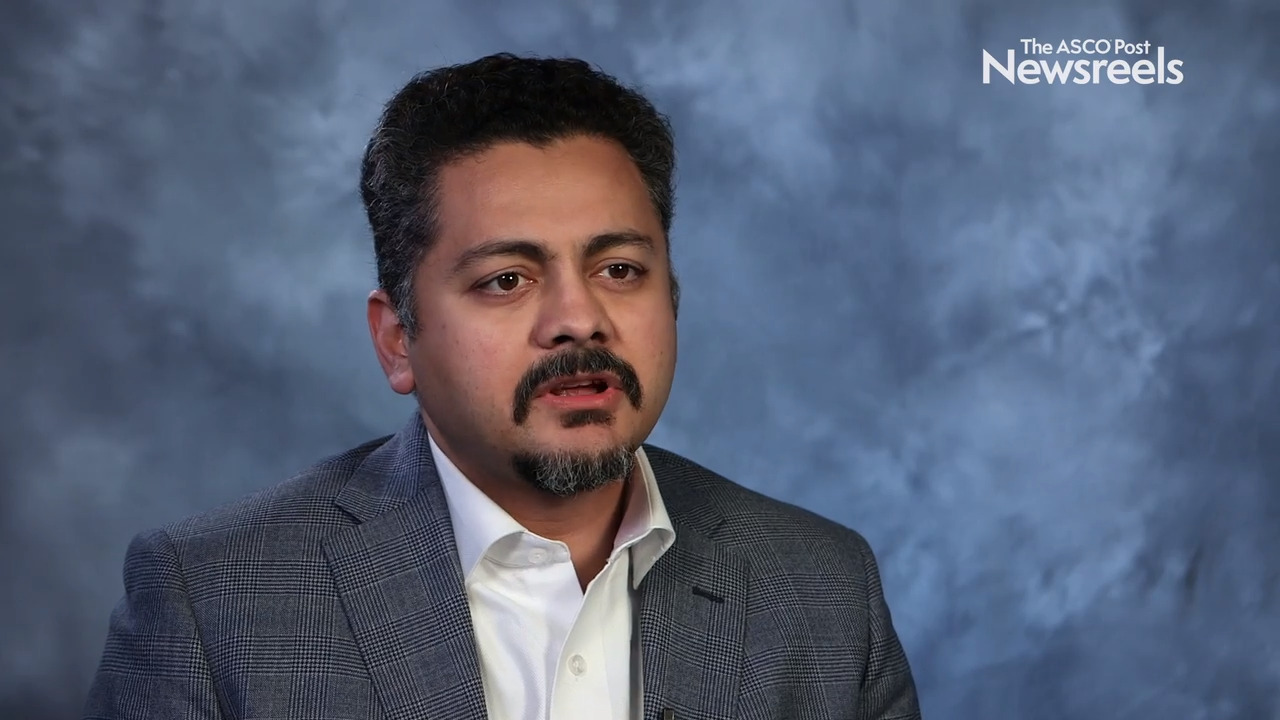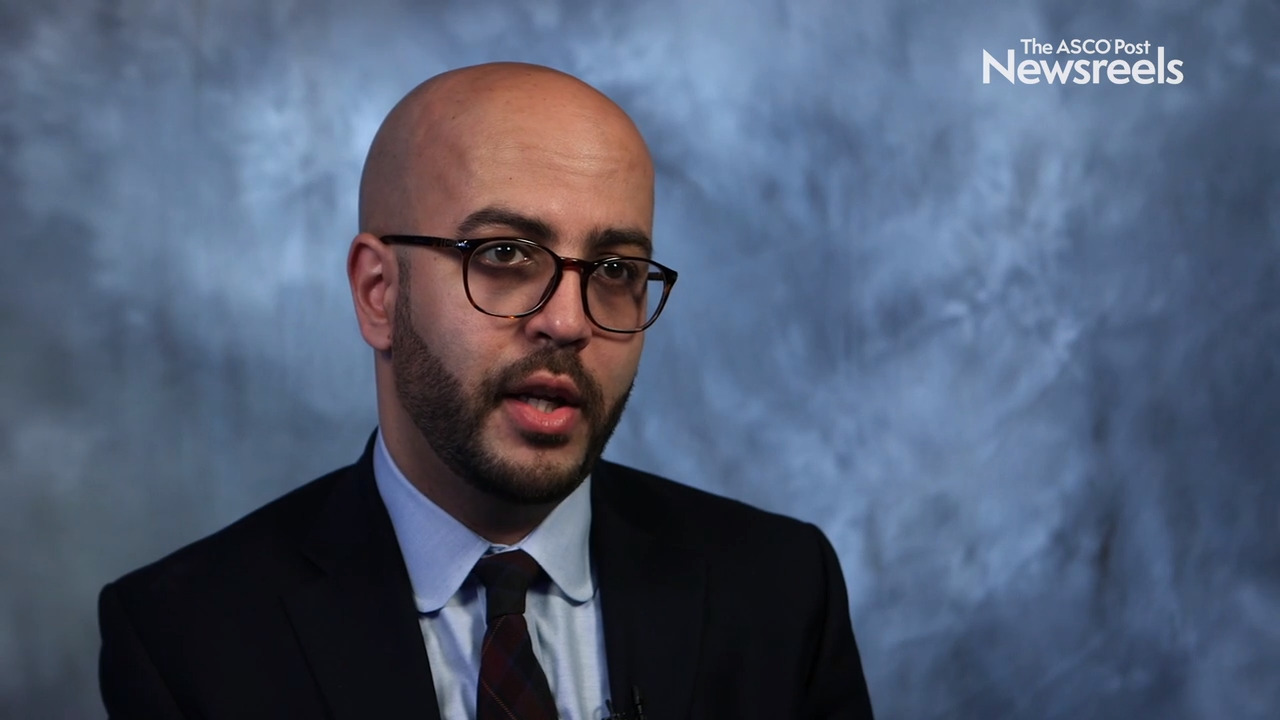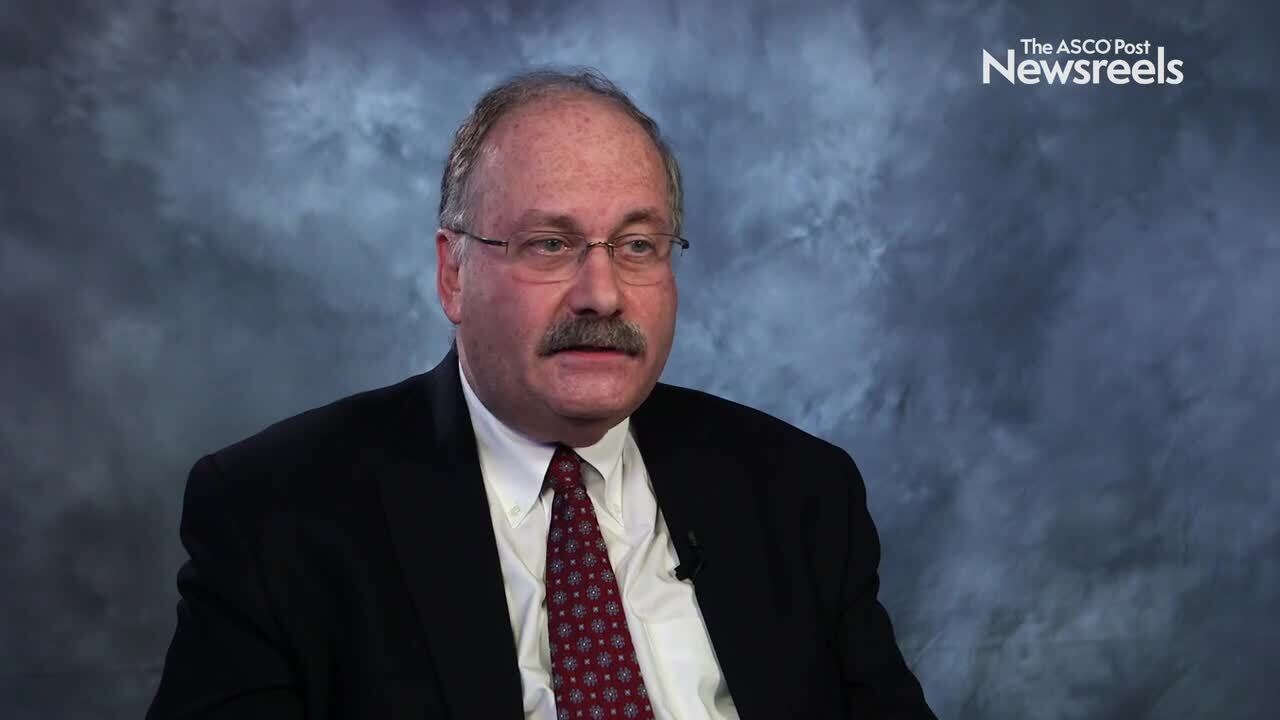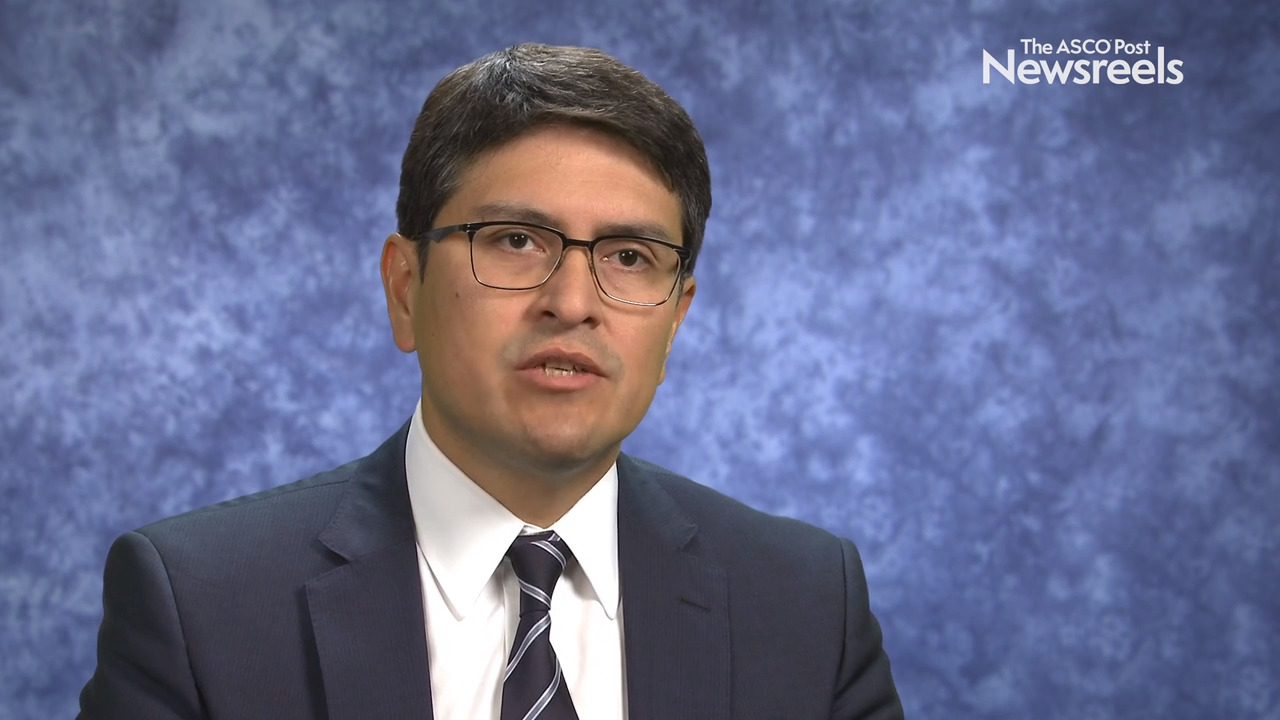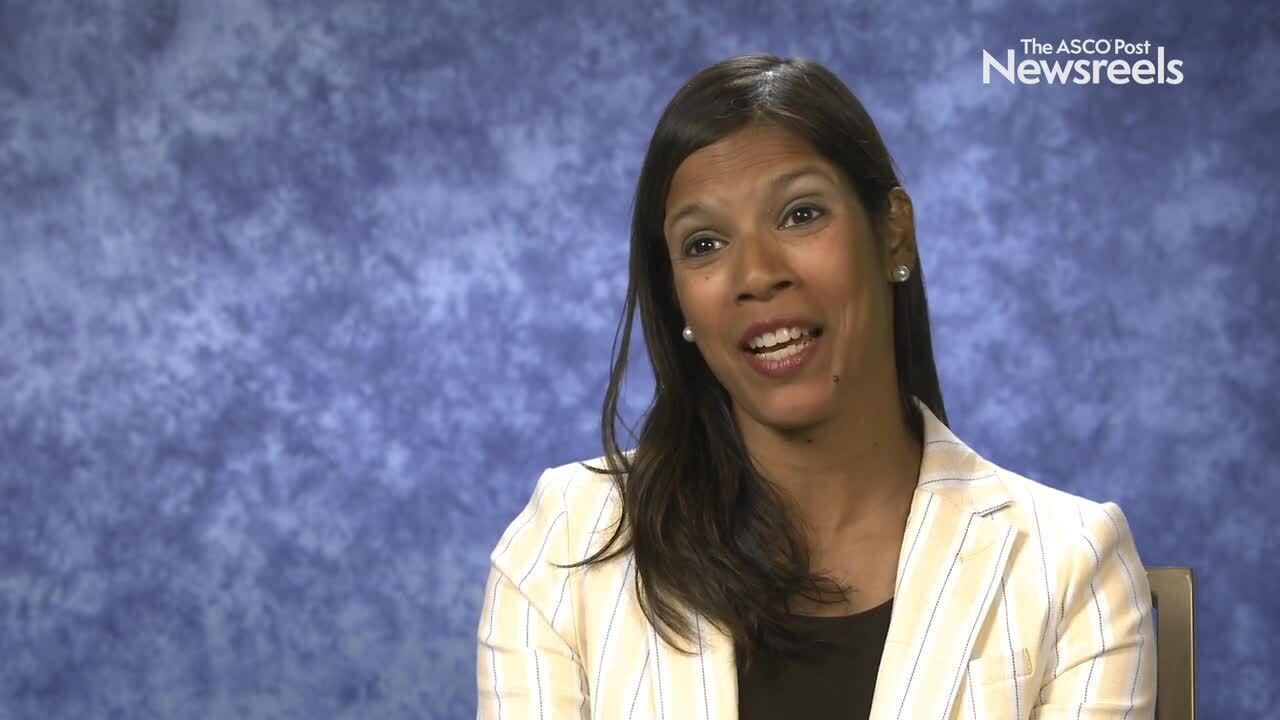Expert Point of View: Thierry Facon, MD, and Michael Jain, MD, PhD
Thierry Facon, MD, of Lille University Hospital in France, and Michael Jain, MD, PhD, of Moffitt Cancer Center, Tampa, were interviewed by The ASCO Post on the second-generation chimeric antigen receptor (CAR) T-cell products for treating multiple myeloma. According to Dr. Facon, essentially...
Next-Generation BCMA-Targeted CAR T-Cell Therapies for Relapsed or Refractory Multiple Myeloma Explored in Early-Phase Trials
Two novel dual-target chimeric antigen receptor (CAR) T-cell strategies are yielding early and durable responses for patients with relapsed or refractory multiple myeloma, as well as potentially less cytokine-release syndrome and neurotoxicity compared with first-generation CAR T-cell products,...
Conference Highlights From the 2019 American Society of Hematology Annual Meeting & Exposition
More than 25,000 specialists in hematology from over 115 countries attended the 61st American Society of Hematology (ASH) Annual Meeting & Exposition held last December in Orlando. The conference featured a stunning array of 4,900 abstracts with impressive new data in the treatment of multiple...
Activity of Anti-BCMA BiTE Molecule AMG 420 in Relapsed or Refractory Multiple Myeloma
In a phase I study reported in the Journal of Clinical Oncology, Max S. Topp, MD, and colleagues found the maximum tolerated dose of the investigational anti–B cell maturation antigen (BCMA) bispecific T-cell engager (BiTE) molecule AMG 420 elicited a high response rate in patients with relapsed or ...
FDA Pipeline: Priority Reviews in Multiple Myeloma, Prostate Cancer
Over the past week, the U.S. Food and Drug Administration (FDA) granted Priority Review to treatments for multiple myeloma and prostate cancer; gave Fast Track designation to a targeted gene therapy for lung cancer; granted Orphan Drug designation to a combination therapy for hepatocellular...
FDA Pipeline: Priority Reviews in Ovarian Cancer, Prostate Cancer, and NSCLC
This week, the U.S. Food and Drug Administration (FDA) granted Priority Review to treatments for ovarian, prostate, and lung cancer; granted Orphan Drug designation to therapies for chemotherapy-induced thrombocytopenia and multiple myeloma; and granted Breakthrough Device designation to platforms...
Selected Abstracts on New Therapies for Newly Diagnosed Multiple Myeloma
To complement The ASCO Post’s comprehensive coverage of the 2019 American Society of Hematology (ASH) Annual Meeting & Exposition, here are several abstracts selected from the meeting proceedings focusing on novel therapeutic regimens including the monoclonal antibody daratumumab in combination ...
Activity of Belantamab Mafodotin in Patients With Heavily Pretreated Relapsed or Refractory Multiple Myeloma
In the phase II DREAMM-2 trial reported in The Lancet Oncology, Sagar Lonial, MD, and colleagues found that the antibody-drug conjugate belantamab mafodotin was active in patients with heavily pretreated relapsed or refractory multiple myeloma. The agent is a conjugate of an anti–B-cell maturation...
Overall Survival With the Addition of Daratumumab to VMP in Newly Diagnosed, Transplant-Ineligible Multiple Myeloma
As reported in The Lancet by Maria-Victoria Mateos, MD, and colleagues, interim analysis of overall survival in the phase III ALCYONE trial has shown a significant benefit of the addition of daratumumab to bortezomib, melphalan, and prednisone (D-VMP) in patients with newly diagnosed multiple...
Taking a Reasonable Approach to Treating Newly Diagnosed Multiple Myeloma
Multiple myeloma is a malignancy characterized by clonal proliferation of terminally differentiated plasma cells within the bone marrow. Although it leads to a host of different issues within the body, overall survival has steadily improved in recent years. “This is largely because of better...
My Dream Is That Multiple Myeloma Will One Day Be in My Past and No Longer a Part of My Future
A year before my diagnosis of multiple myeloma, in 2010, my husband Paul and I moved with our six children to Monterrey, Mexico, where Paul was helping to create a venture capital industry. We were so busy settling into a new country and getting our children integrated into school that when I...
Relapsed or Refractory Multiple Myeloma Outcomes Improving Exponentially
Emerging treatments for relapsed or refractory multiple myeloma include options beyond triplet regimens, including immunotherapy and mutation-driven therapy. Several exciting drugs are poised to be available in the clinic in 2020, according to speakers at the recent JADPRO Live, the annual...
Phase Ib/II Studies Explore Next-Generation BCMA-Targeted CAR T-Cell Therapies in Multiple Myeloma
In patients with relapsed or refractory multiple myeloma, two novel dual-target chimeric antigen receptor (CAR) T-cell strategies are yielding early and durable responses, with seemingly less cytokine-release syndrome and neurotoxicity than first-generation CAR T-cell products, according to the...
Evaluation of Residual Disease in Patients With Multiple Myeloma Using IMWG Flow Cytometry Criteria
In a study reported in the Journal of Clinical Oncology, Paiva et al examined the applicability of International Myeloma Working Group (IMWG) criteria for next-generation flow cytometry assessment of minimal residual disease (MRD) in multiple myeloma. They found that the IMWG flow MRD-negative...
Saad Z. Usmani, MD, on Carfilzomib, Dexamethasone, and Daratumumab for Relapsed or Refractory Myeloma
Saad Z. Usmani, MD, of the Levine Cancer Institute, discusses phase III study findings suggesting that the combination of carfilzomib/dexamethasone/daratumumab represents an efficacious new regimen for patients with relapsed or refractory disease, including those refractory to lenalidomide (Abstract LBA-6).
C. Ola Landgren, MD, PhD, on Carfilzomib, Lenalidomide, Dexamethasone, and Daratumumab for Newly Diagnosed Multiple Myeloma
C. Ola Landgren, MD, PhD, of Memorial Sloan Kettering Cancer Center, discusses phase II study findings that showed an 83% negative rate of minimal residual disease in newly diagnosed multiple myeloma treated weekly with 8 cycles of the quadruplet regimen of carfilzomib/lenalidomide/dexamethasone/daratumumab, without autologous stem cell transplant (Abstract 862).
Mark Bustoros, MD, on Ixazomib/Lenalidomide/Dexamethasone for High-Risk Smoldering Multiple Myeloma
Mark Bustoros, MD, of Dana-Farber Cancer Institute, discusses phase II study results showing that the combination of ixazomib, lenalidomide, and dexamethasone is effective in patients with high-risk smoldering disease, with a high response rate, convenient schedule, and manageable toxicity. Longer follow-up for disease outcome is ongoing (Abstract 580).
I Do Not Have a Multiple Myeloma Precursor Condition. Why Not?
For the country, and for me personally, 2001 was a watershed year. In May, my mother died; the following month my brother, Dom, then 57, called to tell me he had just been diagnosed with multiple myeloma. Except for some fatigue Dom had complained about at our mother’s funeral, there were no...
Addition of Daratumumab Increases Benefit of Carfilzomib/Dexamethasone in Multiple Myeloma
In patients with relapsed or refractory multiple myeloma, the addition of daratumumab to carfilzomib plus dexamethasone improved multiple outcomes, compared with carfilzomib/dexamethasone alone, in the international phase III CANDOR trial.1 “Overall, carfilzomib/dexamethasone/daratumumab was...
Edward A. Stadtmauer, MD, on Advanced Multiple Myeloma and Sarcoma: First-in-Human Assessment of CRISPR-Edited T Cells
Edward A. Stadtmauer, MD, of the University of Pennsylvania Abramson Cancer Center, discusses phase I results of immune cells, modified with CRISPR/Cas9 technology, and infused in three patients (two with multiple myeloma and one with sarcoma). Researchers observed the cells expand and bind to their tumor targets with no serious side effects (Abstract 49).
ASH 2019: Is Autologous Hematopoietic Stem Cell Transplant Safe and Effective for Patients Aged 70 or Older With Multiple Myeloma?
Even though autologous hematopoietic stem cell transplantation (AHCT) is an effective treatment for multiple myeloma, only 4 out of 10 patients receive this therapy. A new study presented by Munshi et al at the 2019 American Society of Hematology (ASH) Annual Meeting & Exposition (Abstract 782) ...
ASH 2019: Dose-Climbing Trial of Dual-Target CAR T-Cell Therapy for Relapsed or Refractory Multiple Myeloma
More than three out of four patients with relapsed multiple myeloma, or myeloma that was refractory to at least two therapies, remained in remission 7 months after treatment with a novel chimeric antigen receptor (CAR) T-cell therapy targeting two proteins that are frequently found on myeloma...
ASH 2019: Phase Ib/II Study of BCMA-Directed CAR T-Cell Therapy for Pretreated Multiple Myeloma
Patients with multiple myeloma who had received a median of five prior therapies with refractory disease had a high response rate when treated with the investigational chimeric antigen receptor (CAR) T-cell therapy JNJ-4528, which targets B-cell maturation antigen (BCMA), a protein commonly found...
Use of an On-Site Touchscreen-Based Geriatric Assessment for Older Patients With Multiple Myeloma
In a study reported in the Journal of Oncology Practice, Nathwani et al found that the use of a tablet-based modified geriatric assessment during physician visits by older patients with multiple myeloma was feasible and provided physicians with information that influenced treatment decisions. Study ...
How the PROMISE Study Aims to Convert Multiple Myeloma Into a Preventable Cancer
In 2018, researchers from Dana-Farber Cancer Institute launched a large, ambitious screening study called (PROMISE; ClinicalTrials.gov identifier NCT03689595) to identify people with premalignant precursor conditions of multiple myeloma, to understand the molecular signs of progression to myeloma...
ICARIA-MM: Addition of Isatuximab to Pomalidomide/Dexamethasone in Relapsed and Refractory Multiple Myeloma
As reported in The Lancet by Michel Attal, MD, and colleagues, the phase III ICARIA-MM trial has shown that the addition of the CD38-targeted antibody isatuximab to pomalidomide and low-dose dexamethasone significantly improved progression-free survival in patients with relapsed and refractory...
A Diagnosis of Multiple Myeloma Taught Me to Live in the Moment
I was just 39 in 2015 when I was diagnosed with multiple myeloma. I have a wife and three young children whom I love, a challenging and fulfilling career, and I wasn’t ready to die. When I was first diagnosed, I met with a medical oncologist who had little experience treating this type of cancer....
Elotuzumab in Combination Therapy for Previously Treated Multiple Myeloma
In late 2018, elotuzumab was approved for use in combination with pomalidomide and dexamethasone for the treatment of adult patients with multiple myeloma who have received at least two prior therapies, including lenalidomide and a proteasome inhibitor.1 Supporting Efficacy Data Approval was based ...
Selinexor/Dexamethasone in Refractory Multiple Myeloma: The STORM Has Arrived, but Does It Represent Climate Change?
The term “relapsed/refractory multiple myeloma” is often used to describe advanced myeloma that has progressed through primary or salvage therapy. The International Myeloma Working Group (IMWG) defined the term in 2011 as disease that is “nonresponsive while on salvage therapy or progresses...
Selinexor Plus Dexamethasone Studied in Triple-Class Refractory Multiple Myeloma
In a phase IIb study (STORM Part 2) reported in TheNew England Journal of Medicine, Ajai Chari, MD, of Tisch Cancer Institute, Icahn School of Medicine at Mount Sinai, and colleagues found that oral selinexor and dexamethasone were active in some patients with multiple myeloma refractory to prior...
Selinexor Plus Dexamethasone Studied in Triple-Class Refractory Multiple Myeloma
In a phase IIb study (STORM Part 2) reported in The New England Journal of Medicine, Ajai Chari, MD, of Tisch Cancer Institute, Icahn School of Medicine at Mount Sinai, and colleagues found that oral selinexor and dexamethasone were active in some patients with multiple myeloma refractory to prior...
Lenalidomide vs Observation in Asymptomatic Smoldering Multiple Myeloma
In a phase III trial reported in the Journal of Clinical Oncology, Sagar Lonial, MD, and colleagues found that lenalidomide significantly improved progression-free survival vs observation in patients with intermediate- or high-risk smoldering multiple myeloma. As noted by the investigators,...
Daratumumab Combination Therapy for Patients With Multiple Myeloma Who Are Eligible for Transplantation
On September 26, 2019, daratumu-mab (Darzalex) was approved in combination with bortezomib, thalidomide, and dexamethasone for the treatment of multiple myeloma in newly diagnosed adult patients eligible for autologous stem cell transplantation (ASCT).1,2 Supporting Efficacy Data Approval was based ...
Continuous Therapy for Multiple Myeloma Offers Survival Advantage, but Questions Remain
The number of approved agents in multiple myeloma has skyrocketed in recent years, leading to significant improvements in survival, but questions remain regarding the optimal duration of treatment. Although traditionally limited to a fixed number of cycles due to accumulating toxicity, novel agents ...
Levofloxacin Prophylaxis During Treatment of Newly Diagnosed Multiple Myeloma
In the phase III TEAMM trial reported in The Lancet Oncology, Drayson et al found that prophylactic treatment with levofloxacin during the first 12 weeks of multiple myeloma treatment in newly diagnosed patients was associated with a significant reduction in first febrile episodes or death from any ...
Study Finds Disparities in Treatment of African American and Hispanic Patients With Multiple Myeloma
African American and Hispanic patients with multiple myeloma generally start treatment with novel therapy significantly later than white patients, according to a study published by Ailawadhi et al in Blood Advances. The study found that, on average, it took about 3 months for white patients to...
Impact of Treating Facility, Provider Volume, and Patient-Sharing in the Treatment of Patients With Multiple Myeloma
A study published by Freeman et al in JNCCN—Journal of the National Comprehensive Cancer Network found that generally, providers with more experience treating multiple myeloma have better outcomes than those with more limited experience. Providers who saw the most cases were more likely to be...
Jorge J. Castillo, MD, on Evolution of Therapy for Relapsed/Refractory Multiple Myeloma
Jorge J. Castillo, MD, of Dana-Farber Cancer Institute, discusses the many advances in treating relapsed and/or refractory multiple myeloma, including novel immunomodulators, proteasome inhibitors, and monoclonal antibodies, as well as emerging treatments such as chimeric antigen receptor T-cell therapy and antibody-drug conjugates.
Nina Shah, MD: How Long Should Initial Treatment for Myeloma Last?
Nina Shah, MD, of the University of California, San Francisco, discusses the debate on fixed duration vs waiting until disease progression, a key question for clinicians treating patients with multiple myeloma.
FDA Approves Daratumumab Combination for Transplant-Eligible Patients With Multiple Myeloma
On September 26, 2019, the U.S. Food and Drug Administration approved daratumumab (Darzalex) in combination with bortezomib, thalidomide, and dexamethasone for newly diagnosed adult patients with multiple myeloma who are eligible for autologous stem cell transplant (ASCT). Efficacy was investigated ...
FDA Pipeline: Breakthrough Therapy Designation in Lung Cancer, Orphan Drug Designations in Myeloma and Soft-Tissue Sarcoma
Recently, the U.S. Food and Drug Administration (FDA) granted Breakthrough Therapy designation to tepotinib for metastatic non–small cell lung cancer harboring MET exon 14 skipping alterations, and Orphan Drug designations to novel chimeric antigen receptor T-cell therapies in both multiple myeloma ...
Daratumumab-Based Therapy for Patients With Newly Diagnosed Multiple Myeloma Who Are Ineligible for Transplantation
On June 27, 2019, daratumumab was approved for use in combination with lenalidomide and dexamethasone for patients with newly diagnosed multiple myeloma who are ineligible for autologous stem cell transplantation.1,2 Supporting Efficacy Data Approval was based on findings in the open-label phase...
Is It Time to Intervene in Smoldering Myeloma?
Early intervention in smoldering multiple myeloma prevents progression to symptomatic disease and should be strongly considered for patients meeting new criteria for high risk, according to Sagar Lonial, MD, Professor and Chair of Hematology and Medical Oncology and the Anne and Bernard Gray...
Selinexor/Dexamethasone in Triple-Class Refractory Multiple Myeloma
In the phase IIb STORM Part 2 study reported in The New England Journal of Medicine, Chari et al found that the combination of oral selinexor and dexamethasone produced responses in patients with multiple myeloma refractory to prior treatment with an alkylating agent, immunomodulatory agent, and...
Selinexor in Relapsed or Refractory Multiple Myeloma
In the Clinic provides overviews of novel hematology and oncology agents, addressing indications, mechanisms of action, administration recommendations, safety profiles, and other essential information needed for the appropriate clinical use of these drugs. On July 3, 2019, the oral nuclear export...
Notable Presentations at ASCO 2019 Included Studies in Sarcoma, Lymphoma, Myeloma, and Breast and Kidney Cancers
The 2019 ASCO Annual Meeting featured a wealth of presentations on important topics. In addition to our regular news coverage of the meeting, we present below some highlights of other studies that add to our knowledge base for treatment of various cancers. Olaratumab in Soft-Tissue Sarcoma...
FDA Grants Accelerated Approval to Selinexor in Combination With Dexamethasone in Pentarefractory Multiple Myeloma
On July 3, the U.S. Food and Drug Administration (FDA) granted accelerated approval to selinexor (Xpovio) in combination with dexamethasone for adult patients with relapsed or refractory multiple myeloma who have received at least four prior therapies and whose disease is refractory to at least two ...
FDA Approves Daratumumab in Combination With Lenalidomide and Dexamethasone for Newly Diagnosed Multiple Myeloma
On June 27, the U.S. Food and Drug Administration (FDA) approved daratumumab (Darzalex) in combination with lenalidomide and dexamethasone for the treatment of patients with newly diagnosed multiple myeloma who are ineligible for autologous stem cell transplant (ASCT). The application received...
Stratification Tool to Predict VTE in Patients With Multiple Myeloma Treated With Immunomodulatory Drugs
New research published by Li et al in JNCCN–Journal of the National Comprehensive Cancer Network has identified a way to help clinicians caring for patients with multiple myeloma to predict blood clots in order to take preventive action. The researchers established a set of risk factors to...
FDA Pipeline: Designations and Applications Granted in Lymphoma, Small Cell Lung Cancer, Multiple Myeloma, and More
Recently, the U.S. Food and Drug Administration (FDA) granted Fast Track designation to a phospholipid-drug conjugate in diffuse large B-cell lymphoma; granted Orphan Drug designation to an immunotherapy for small cell lung cancer (SCLC); accepted supplemental biologics license applications (sBLAs) ...
